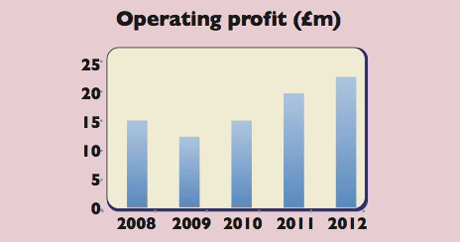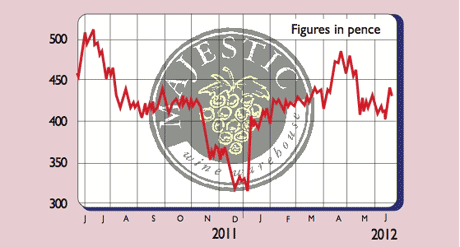Shares in focus: Britain’s largest wine specialist
Majestic is a great example of a retail business that can thrive in a downturn. But are its shares cheap enough to buy now? Phil Oakley investigates.
Get the latest financial news, insights and expert analysis from our award-winning MoneyWeek team, to help you understand what really matters when it comes to your finances.
You are now subscribed
Your newsletter sign-up was successful
Want to add more newsletters?

Twice daily
MoneyWeek
Get the latest financial news, insights and expert analysis from our award-winning MoneyWeek team, to help you understand what really matters when it comes to your finances.

Four times a week
Look After My Bills
Sign up to our free money-saving newsletter, filled with the latest news and expert advice to help you find the best tips and deals for managing your bills. Start saving today!
Majestic is a great business, but it looks expensive keep it on your watch list, says Phil Oakley.
The business
Majestic Wine is Britain's largest wine warehouse specialist with 181 stores. It sells wine direct to the public and to business customers such as hotels, pubs and restaurants. Around 10% of its sales are made over the internet.
It has a small business in France called Wine & Beer World with stores in Calais and Cherbourg. Its fine wines business, Lay & Wheeler, specialises in selling quality wines from Bordeaux and Burgundy. A large proportion of Lay & Wheeler's sales come from selling vintage wines in advance (en primeur). Majestic differentiates itself by focusing on large ranges of quality wines and excellent customer service. It had sales of £280m in the year to April 2012.
MoneyWeek
Subscribe to MoneyWeek today and get your first six magazine issues absolutely FREE

Sign up to Money Morning
Don't miss the latest investment and personal finances news, market analysis, plus money-saving tips with our free twice-daily newsletter
Don't miss the latest investment and personal finances news, market analysis, plus money-saving tips with our free twice-daily newsletter
The history
The business began in 1980 when Majestic Vintners opened its first wine warehouse in north London. It was managed by Tony Mason. By 1985, it had 13 stores. In 1986, Tony Mason left to set up Wizard Wine. This business was sold to Bejam in 1987. When Bejam was bought by Iceland in the same year, Mason and two other directors decided to buy back Wizard. In 1991 Wizard bought Majestic and the two traded as Majestic Wine Warehouses the following year.
The 1990s saw steady growth in the number of stores with internet sales beginning in 2000. In 2001, Majestic entered the French market, selling wine and beer mainly to British customers in the Channel ports. Its fine wine business started in 2003, which was boosted in 2009 by the purchase of Lay & Wheeler.
Profits fell sharply in 2008 as the recession saw business customers cut back on their wine purchases. New chief executive Steve Lewis then set about changing the company's business model. In 2009, the minimum purchase level was cut from 12 to six bottles and as a result the number of customers began growing again, as did profits.
The chief executive
Steve Lewis has been chief executive since 2008. He has been at Majestic Wine most of his working life, having started out as a graduate trainee in 1985. His idea to change the company's minimum buying quantity from 12 bottles to six apparently came to him after he failed adequately to explain the company policy to a customer who wanted to buy just a couple of bottles.
If he couldn't do this, he realised that he couldn't ask other staff to either. He was paid £593,000 in 2011.
Should you buy the shares?
With profits growing strongly, Majestic is clearly doing something right in a very tough environment. It gives further proof to the well-known maxim that to survive and prosper in retail, you have to do something different. The company has a strong appeal to people who want a better range of the sort of quality wines that are different from those they could get in supermarkets.

The decision to cut the minimum order size in store and now online continues to be popular customer numbers increased by 11.1% last year. Majestic's strong emphasis on customer service and educating its employees has given it a competitive advantage that supermarkets are unlikely to match. Add in out-of town stores with parking and regular in-store wine tasting events and Majestic has built up a strong connection with its customers. But can it keep growing?
In the short term sales patterns are expected to be lumpy, with peaks around seasonal or special events. Looking further out, the company thinks that there is room for 330 stores in Britain. If this is the case, then there's scope for profits to keep on growing. We think Majestic Wine is a good business, but would like to buy the shares when they are a little cheaper, even though the dividend yield is already quite attractive. With good long-term prospects, put the shares on your watch list.
The numbers

Stockmarket code: MJW
Share price: 430p
Market cap: £273m
Net assets (Apr 2012): £76.5m
Net cash (Apr 2012): £1.1m
P/e (current year estimate): 14.8 times
Yield (prospective): 4.0%
What the analysts say
Buy: 5
Hold: 2
Sell: 0
Average price target: 476p
Directors' shareholdings
S Lewis: 97,846
N Alldritt: 75,000
J Apthorp: 762,873
Get the latest financial news, insights and expert analysis from our award-winning MoneyWeek team, to help you understand what really matters when it comes to your finances.
Phil spent 13 years as an investment analyst for both stockbroking and fund management companies.
-
 8 ways the ‘sandwich generation’ can protect wealth
8 ways the ‘sandwich generation’ can protect wealthPeople squeezed between caring for ageing parents and adult children or younger grandchildren – known as the ‘sandwich generation’ – are at risk of neglecting their own financial planning. Here’s how to protect yourself and your loved ones’ wealth.
-
 What are Avios-only flights and who is eligible?
What are Avios-only flights and who is eligible?Avios-only flights have proved incredibly popular since launching in 2023. We explain what they are, how they work and who qualifies